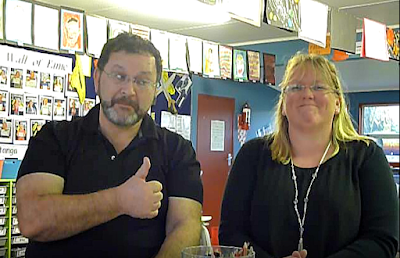Week 10 - DIGITAL - Real World Learning and Crowdsourcing
Crowdsourcing
Crowdsourcing is the practice of engaging a ‘crowd’ or group for a common goal, such as innovation, problem solving or efficiency.It can take place on many different levels and across various industries. Thanks to our growing connectivity, it is now easier than ever for individuals to collectively contribute, whether with ideas, time, expertise, or funds, to a project or cause. (Crowdsourcing Week, 2017).
If you want to learn when 'crowdsourcing' became a trend, take a look at the real data that Google shares with us: www.google.co.nz/trends/explore#q=crowdsourcing
OpenIDEO
This is an open and global community working together to design solutions for the world’s biggest challenges. You can see some examples of the types of projects that are included on the site by looking at the IDEO Stories
Hacking NZ Education
Hackeducation is a crowdsourcing platform set up by The Mind Lab by Unitec to collaboratively brainstorm ideas of what the future of education in New Zealand could look like.
We have been analysing the crowdsourced data from this web site over a number of phases:
- Gathering Ideas from the crowd → 888 responses (by end of January 2017)
- Analysis (Themes) → Data were analysed by crowdsourcing using students from the postgrad November 2016 intake. From this, 13 frequently mentioned concepts/themes were identified
- Analysis (Relationships) → Students from the postgrad March 2017 intake were asked to identify relationships between the concepts identified in the previous phase, and a domain model was developed from these relationships.
- Faces of Change → a website was created to capture our students' reactions to how they are responding to the themes within the Hackeducation data.
Real World Problems
Real-world problems have all of the following characteristics (ITL Research, 2013):
- Are experienced by real people. For example, if students are asked to diagnose an ecological imbalance in a rainforest in Costa Rica, they are working with a situation that affects the real people who live there.
- Have solutions for a specific, plausible audience other than the educator as grader. For example, designing equipment to fit a small city playground could benefit the children of the community.
- Have specific, explicit contexts. For example, developing a plan for a community garden in a public park in their town has a specific context; learning which vegetables grow best in which parts of one’s country does not.
- If students are using data to solve a problem, they use actual data (for example, real scientific records of earthquakes, results of their own experiments, or first-person accounts of an historical event), not data developed by an educator or publisher for a lesson.
Citizen Science
Engaging in citizen science allows people to experience, first-hand, the scientific process and engage scientific thinking at the same time as increasing their knowledge of the specific research topic. Citizen scientists are members of the general public that volunteer their time to work and collaborate with professional scientists to collect data and solve problems on real scientific research questions. (Masters et al., 2016).
Zooniverse
The flipped task was to draw a diagram linking the Zooniverse ‘Build a Project’ process with Kotter’s 8 stages of change.
Zooniverse claims to be the world’s largest and most popular platform for people-powered research. Research is made possible by volunteers, hundreds of thousands of people around the world who come together to assist professional researchers. The goal is to enable research that would not be possible, or practical, otherwise. Zooniverse research results in new discoveries and datasets useful to wider research.
Zooniverse projects have two distinct aims, (Masters, Oh, Cox, Simmons, Lintott, Graham, Greenhill, & Holmes, 2016). The first is to solve specific scientific problems through the use of citizen scientists. The second aim is to engage members of the public with real world science to educate and change attitudes towards science. Citizen scientists are members of the general public that volunteer their time to work and collaborate with professional scientists to collect data and solve problems on real scientific research questions. Citizen science is not a new concept but has become more accessible to people around the world through the use of the Internet. Edmund Halley used citizen science in 1714 when he got members of the public to report the total eclipse of the Sun across England.
Through platforms like Zooinverse citizen scientists are able to view, record, analyse, process and answer incredibly large amounts of data that would not be possible by the scientists doing the research alone. The first project, Galaxy Zoo, received 70,000 classifications per hour and more than 50,000,000 classifications in the first year (Graham et al., 2015).
Crowdsourcing by The Mind Lab by Unitec
As well as using crowdsourcing for the Hackeducation project, we also use it to help us decide where to run the postgrad programme. Do you know anyone who would like to join us for a future intake? Where should we go next? See the interactive map at wheretonext.school.nz/
Please also share the Pop-up Labs URL or our Facebook posts with your colleagues:
Part of our own marketing strategy is that we trust you wanting to help us.
References
Crowdsourcing Week. (2017). What is crowdsourcing? Retrieved from http://crowdsourcingweek.com/what-is-crowdsourcing/
Graham, C.G., Cox, J, Simmons, B, Lintott, C, Masters, K, Greenhill, A. & Holmes, K. (2015). Defining and Measuring Success in Online Citizen Science: A Case Study of Zooniverse Projects. Computing in Science & Engineering, 17(4), 28-41.
ITL Research. (2013). 21CLD Learning Activity Rubrics. Retrieved from: https://education.microsoft.com/GetTrained/ITL-Research
Masters, K., Oh, E. Y., Cox, J., Simmons, B., Lintott, C., Graham, G., Greenhill, A., & Holmes, K. (2016). Science learning via participation in online citizen science. Journal of Science Communication, 15(3), 1-33.


No comments:
Post a Comment